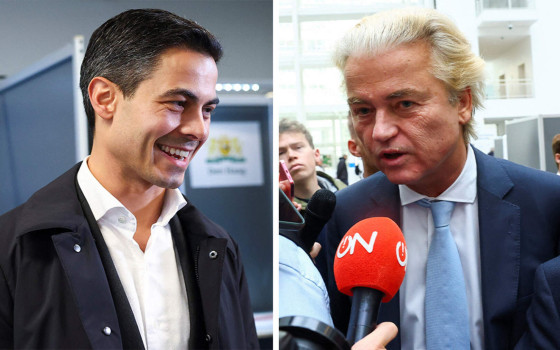Dutch Elections: Good News for Immigrants... Far-Right Loses 11 Seats, Progressive Liberals Win... Voter Turnout Nears 80%... Expectations for the New Government Formation

- Europe and Arabs
- Thursday , 30 October 2025 10:38 AM GMT
The Hague – Brussels: Europe and the Arabs
With nearly 98% of the votes counted in the Dutch elections, the progressive liberal party D66, led by Rob Geiten, and the far-right Freedom Party, led by Geert Wilders, remain tied with 26 seats each. This is according to initial projections from the electoral commission. The difference in votes was only 2,300 in favor of D66. Thus, the far right lost 11 seats compared to the previous election, while the liberal-progressive party gained 17 seats, making it the biggest winner. D66 is known for its less hostile stance towards immigrants, unlike Wilders' party, which is known for its anti-immigrant positions, particularly against Muslims. Wilders has made statements and taken positions reflecting this, calling for the closure of the country's borders to immigrants and the expulsion of refugees.
For the first time, the largest party in the Netherlands has fewer than 30 seats.
This is the first time in Dutch history that the largest party has been forced to settle for fewer than 30 seats in the House of Representatives. This is evident from the initial projections. A total of 30 seats represents approximately 20% of the vote. The failure of any party to reach this threshold threatens to complicate coalition formation. According to opinion polls, at least four parties will be needed to achieve a 75+1 majority in the House of Representatives. A coalition of the three largest parties—a highly unlikely combination of D66, the Party for Freedom, and the People's Party for Freedom and Democracy—would win 74 seats. Therefore, D66, which is likely to win the right to initiate the formation of a new government, would need to secure enough partners. Party leader Rob Geyten told Dutch public broadcaster NOS after the polls were published that a coalition with GroenLinks-PvdA would be "a very logical choice," "if you only look at the number of seats they won." He also mentioned the VVD and CDA, "which are performing well."
This four-party coalition would win 86 seats, more than enough for a majority. However, Dylan Eijseljos, leader of the VVD party, has repeatedly stated that she does not want to form a government with GroenLinks-PvdA.
The Dutch party landscape is deeply fragmented, partly due to the absence of an electoral threshold. The House of Representatives is likely to have 15 parties again in the next legislative session. The latest projections indicate that the NSC party will disappear, but the older party "50 Plus" will return to parliament with two seats. Between 2012 and 2022, "50 Plus" also had representation in parliament.
According to the newspaper De Volkskrant, this is the first time since 2010 that no entirely new parties will be represented in the House of Representatives.
The D66 party is the largest in Rotterdam and The Hague, while the GroenLinks-PvdA party is the largest in Amsterdam.
The victory of the progressive liberal D66 party in the elections was reflected in a clear advance in the major Dutch cities. D66 became the largest party in Rotterdam and The Hague, among other places, according to election results released Thursday morning.
D66 made significant gains in Rotterdam, where its share rose from 7.0% to 17.1%. GroenLinks-PvdA followed closely behind with 16.9%, a loss of 3.1 percentage points. Both parties thus surpassed Geert Wilders' Dutch Freedom Party, which was the largest party in the port city two years ago. In The Hague, nearly one in five residents voted for Rob Geiten's left-wing liberal party. Two years ago, the party received only 8% of the vote. The share of the GreenLinks-PvdA party in The Hague fell from 19% to 16%. In Wednesday's Dutch parliamentary elections, slightly more people voted than in the previous election in 2023, according to the latest figures released Thursday by the ANP election service.
While Wednesday evening suggested a slightly lower turnout, the latest figures show a participation rate of 78.4% on Thursday morning. This is slightly higher than the previous election, when 77.8% of all eligible voters cast their ballots.
Turnout in parliamentary elections has fluctuated in recent decades. The highest turnout in recent history was in 2017, when 81.9% of Dutch voters participated. The lowest was in 1998, when more than a quarter of eligible voters abstained.
Of all the provinces, Utrecht had the highest turnout this year (82.2%), while Flevoland had the lowest (73.8%). Voting is not compulsory in the Netherlands. Unlike neighboring Belgium, according to Belgian local newspapers on Thursday














No Comments Found